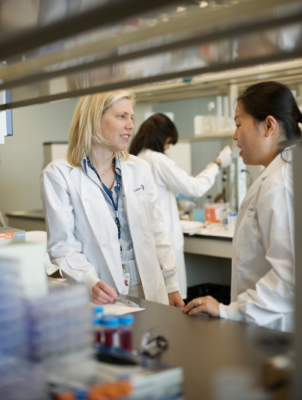Surgeon-scientist Dr. Rebecca Auer is leading a world-first clinical trial that she hopes will protect cancer patients from COVID-19 and other respiratory infections by boosting their immune systems during treatment. The trial was funded in part thanks to donor support to the COVID-19 Emergency Response Fund.
“A cancer diagnosis is scary at the best of times, but the pandemic has made it even worse,” said Dr. Auer, surgical oncologist and Director of Cancer Research at The Ottawa Hospital and associate professor at the University of Ottawa. “Cancer patients have weakened immune systems, which makes them more likely to get severely ill from COVID-19.”
At best, a severe infection could delay a patient’s cancer treatment. At worst, it could kill them.
Patients receiving cancer treatments are the most at risk because the treatments further weaken their immune system. This at-risk population is quite large – over 90,000 people received radiotherapy or chemotherapy treatments in Ontario alone in 2019.
“While there are many specific vaccines for COVID-19 in the works, they won’t be available for at least a year. Cancer patients need protection now.” – Dr. Rebecca Auer
Boosting the immune system during treatment
Dr. Auer and her team at The Ottawa Hospital came up with the idea of testing whether boosting cancer patients’ immune systems during their treatment could help prevent COVID-19 and other respiratory infections. In collaboration with scientists at the Ontario Institute of Cancer Research, they explored an immune-stimulator called IMM-101. Then she worked with Canadian Cancer Trials Group at Queen’s University to design and run the clinical trial at nine cancer centres across Canada.
The researchers will recruit 1,500 patients currently receiving cancer treatment to this clinical trial. Patients will be randomly assigned to receive either regular care, or regular care plus IMM-101. This preparation of harmless heat-killed bacteria had been developed as an anti-cancer therapy because it stimulates the immune system. It has already been safely given to 300 advanced cancer patients in earlier trials.
Training the innate immune system

This trial takes advantage of a lesser-known aspect of the immune system — innate immunity. This first-response arm of the immune system plays a key role in detecting viruses.
Innate immune cells recognize features that are common to many viruses, allowing them to attack viruses the body has never seen before. This is different from the adaptive immune system, which only recognizes viruses the body has already encountered through prior infection or through a vaccine.
The research team hopes that because the IMM-101 treatment can train the patient’s innate immune system, it will help to fight off the COVID-19 virus, in addition to other viruses that cause respiratory infections.
“There is good data to suggest that the reason some people have no symptoms from COVID-19 while others get very sick is their innate immune system’s ability to respond early and quickly to the virus. This made us consider whether we could use an innate immune booster to prevent COVID-19 infections.” – Dr. Rebecca Auer
Based on data from other immune stimulators, it’s likely that this immune-boost would be temporary. But researchers hope it will last long enough to get a patient through their cancer treatments. Once the treatments have ended, the patient’s immune system would return to its regular strength and be strong enough to fight off viruses on its own.
Protection from more than COVID-19
The advantage of this immune-boosting approach is that it could help cancer patients fight off all sorts of viruses while they are undergoing cancer treatments and are at their most vulnerable.
“The treatment we’re using trains the immune system to do a better job fighting the next viral infection,” said Dr. Auer. “It’s not specific to COVID-19, but actually applies to any viral respiratory illness.”
If successful, IMM-101 could also offer benefits to people with other chronic illnesses or compromised immune systems who are similarly at a heightened risk of serious outcomes from COVID-19. It could also help protect people with cancer from other respiratory infections like the seasonal flu.
Preparing for future pandemics
“In 20 years, we’ve had three coronavirus epidemics or pandemics –SARS, MERS and COVID-19—so it’s likely that we’ll see another,” said Dr. Auer.
“We think harnessing innate immunity could be one of our best weapons for fighting COVID-19 and could be easily adapted to tackle future pandemics.” – Dr. Rebecca Auer
Donate today to support promising research and clinical trials like this one.
Cancer patients undergoing active treatment who are interested in participating in this trial should speak with their cancer specialist.
The Ottawa Hospital Foundation provided seed funding for this project through the COVID-19 Emergency Response Fund, funded by generous donors in the community. Read about other projects that have received funding thanks to donor support and are making a difference in the fight against COVID-19.
Additional funding and in-kind support for this trial have been provided by the Canadian Cancer Society, BioCanRx, the Ontario Institute for Cancer Research, The Ottawa Hospital Academic Medical Organization, ATGen NK Max Canada, and Immodulon Therapeutics, the manufacturer of IMM-101.
The Ottawa Hospital is a leading academic health, research, and learning hospital proudly affiliated with the University of Ottawa.




